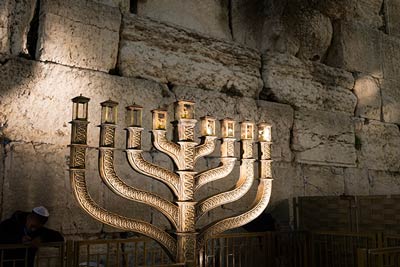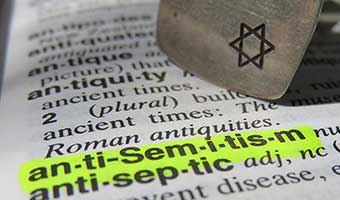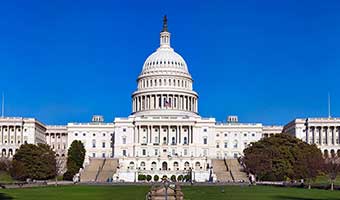
Nurse and Patient Embrace After 71 Years: Hanukkah Miracle #8
A modern miracle took place just before Hanukkah this year at a study day about the British detention camps on Cyprus, where 52,000 Jews, mostly Holocaust survivors captured on Israel-bound ships like the Exodus, were put behind barbed wire after World War II, before the State of Israel came into being.
The last speaker on the program was Margalit Fried, 92. Born in Germany, Fried and her four siblings were among the children rescued from Germany by Henrietta Szold and Youth Aliyah in 1938 and brought to a village near Haifa. “I remember the day Ms. Szold came to visit, and I got to present her with a box of chocolate,” she said. Fried grew up to be a Hadassah nurse and in 1947 got permission to volunteer with the many babies being born in Cyprus. “It was a shock,” she recalled. “At Hadassah Hospital, everything was sterile. Here in Cyprus, 60 babies and 120 parents were crowded into a space so small that there wasn’t even light.”
On that first day she overheard a conversation about a very sick baby. The doctor and nurse in charge wanted to call an ambulance so that the baby wouldn’t die in the BabyHouse. Fried impulsively volunteered to care for the baby. Although she didn’t speak a common language with the young parents from Hungary, she convinced them to give their baby into her care. “There’s no time to waste,” she said. For the next three days, she sat in a storeroom and fed him water with a teaspoon because there were no bottles. She washed him and built a bed for him from a carton. “Finally, he stopped throwing up,” Fried continued. “The Baby House was noisy, but when people came near that room, they whispered. Everyone knew something holy was going on.” Two weeks later, she returned the baby to his parents, and someone slipped another infant into her arms. What was the baby’s name? She had no idea. “There were so many babies,” she said. The emcee of the program couldn’t prevent a grin. There was a stirring in the audience. A stocky man, announced as Meir Weiss, came onto the stage. A father of three, Weiss, now 71, is the proprietor of the Weiss Bakery in Herziliya, famous for cheesecake, Hungarian frosted rum cake, and, yes, Hanukkah donuts. He was the baby Fried saved. When he wrapped the petite nonagenarian nurse in his baker’s arms and sobbed, so did the 300 people in the audience.
Youth Aliyah graduates, like nurse Margalit Fried, have played and continue to play a special role in giving back to Israeli society. Today, at Hadassah youth villages Meir Shfeya and Hadassah Neurim, nearly all the graduates serve in the IDF and volunteer for an additional year to do community work.
While lighting the 8th candle tonight, feel proud for rescuing all those young people, as the blessing says, “in times past and today.” And remember, miracles don’t happen in a vacuum. We have to make them happen right here on earth.
Double Trouble: Hanukkah Miracles #6 and #7
Double trouble. The parents of seven-month-old twins were worried. They knew that viruses usually pass in three days, but their twin daughters weren't getting better.
On the first day of Hanukkah, they brought the babies to the pediatrician's office. Their oxygen saturation levels were so low that the pediatrician called an ambulance. While both twins needed oxygen, one twin was turning blue. Because there were two of them, the ambulance was running out of oxygen as they entered the gates of Hadassah Hospital Ein Kerem.
Hadassah’s Emergency Room team went into quick action to get them hooked up with oxygen. “We put the beds close together so it was easier for the parents,” said the ER nurse who admitted them.
A few hours later they were stabilized enough to move to the Charlotte R. Bloomberg Mother and Child Center. The twins had bronchiolitis, a common infection that affects the bronchioles, the tiny airways that lead to the lungs.
Because they had such difficulty breathing, it was judged safer to keep them in the hospital, explained Prof. Shimon Reif, Director of Pediatrics at Hadassah Ein Kerem. “It's never fun to have sick kids," said the mom, but I know I'm in the best hands, and I would be scared at home.” She added, “I don't feel that I'm missing Hanukkah because people keep coming by with gifts and music to make the holiday pleasant. Outside it's raining and cold, and I wouldn't go out with the babies. anyway.”
The famous players of Jerusalem's Hapoel basketball team were among the visitors. “I was really touched that they came by,” the mom related. Also on hand to lighten the day were the members of a volunteer klezmer band, playing Hanukkah tunes.
Mom and dad were taking turns staying in the hospital with the twins because they have two older children at home. They are hoping that relatives will invite the older children to stay with them for the Sabbath so that mom and dad can spend it together in the hospital.
The couple sends huge gratitude to Hadassah’s supporters for the loving care at Hadassah Hospital.
First New Mt. Scopus Delivery Room Since 1976: Hanukkah Miracle #5
Tonight, the night of the fifth Hanukkah candle, will be the first time since Hanukkah began that Elisheva Levine will get home to her family for candle lighting.
"I can't complain,” she says, “because an event like this happens once in 40 years." Mrs. Levine is the head nurse midwife at Hadassah Hospital Mount Scopus, and this Monday, the first new delivery room complex was dedicated since Hadassah Mount Scopus itself was re-opened in 1976.
The complex was ready on time for the festive dedication on Hanukkah. The beautiful ten-bed center has huge labor and delivery rooms, with stylish bathrooms--some with whirlpool baths--and lots of space for family members, who accompany the mom in labor. "Because it's brand new, I wanted to be there for anything that might come up, day or night, and to make sure everything was running smoothly," said Mrs. Levine.
Having immigrated to Israel from Chicago when she was 18, Mrs. Levine has delivered more than 1,000 babies. She heads a team of 40 Jewish and Arab midwives, who literally work day and night bringing babies into the world.
On Tuesday, the first day the delivery room was open for business, in walked a pregnant Hadassah nurse--Yezina Berhanu, who works in internal medicine. Born in Ethiopia, she immigrated to Israel when she was 16. She's been a nurse at Hadassah for five years. When she finished her shift at 11 p.m. on Monday evening, she went home, feeling what she assumed were a few random contractions. She had two children at home--a boy and a girl--so she'd been through labor before. The contractions came and went all night, but by morning, she thought she should go back to the hospital, a ten-minute ride from her home.
By the time she checked into the new delivery rooms, she knew she was in labor. "The red carpet was still there from the previous night's ceremony and I felt like a princess being escorted into Room Number One," Mrs. Berhanu recalled. She gave birth "speedily and in great comfort" (not always the description of labor!) to a handsome baby boy, who everyone says looks just like her. "It all felt so luxurious," said Mrs. Berhanu. "I wish everyone such an easy delivery."
Mrs. Berhanu spent two nights in the hospital and was ready to go home today. So was Mrs. Levine. "Everything is going great,” she said, “and tonight, my husband, my eight children, and my grandchildren will all be over to celebrate Hanukkah and this glorious week for Hadassah."
Mrs. Behanu sends a thank you and a blessing to Hadassah supporters around the world. "May you continue in your wonderful work, and may you always be able to do good deeds. May the light of Hanukkah always shine for you."
A Kidney Donor, Her Recipient, and a Thanksgiving Dinner: Hanukkah Miracle #4
Remember when Hanukkah and Thanksgiving coincided on the calendar? The first Thanksgiving was the Pilgrim's "seudat hodiya," a feast to thank God.
Well, this Hanukkah, Estee Lerer, age 28, who donated a kidney several weeks ago, insisted on making a thanksgiving feast together with Dargash Tarfa, age 23, the recipient of her kidney. What a Hanukkah party it was! Mr. Tarfa, who was born in Ethiopia, had immigrated to Israel with his widowed mother and six siblings. He had been on dialysis for three years! Mrs. Lerer was of Hassidic background and had wanted to donate a kidney since she was 16 years old.
Despite their different backgrounds, he and Mrs. Lerer were a perfect kidney match. The successful surgery took place at Hadassah Hospital Ein Kerem. The party was held in the basement of a synagogue near Hadassah Hospital Mount Scopus.
Mrs. Lerer and her siblings cooked all the food. The Lerer family arrived first, dressed in their festive attire. A little later, the Tarfas arrived in a van from Lod, where they live. Mr. Tarfa’s mother, grandmother, and aunts were wearing long white embroidered dresses, traditional holiday garb for Ethiopian Jews. Mr. Tarfa, feeling fit for the first time in years, ate heartily and danced.
The festivities culminated with Mr. Tarfa lighting the Hanukkah candles and chanting the blessings. When he got to the part of the blessing "sh' asa nissim" about “miracles for our ancestors in those days, in this time,” Mrs. Lerer’s husband, Hanan, shouted out the word "miracles!" The only disappointment was that surgeon Abed Khalaileh, who operated both on the donor and the recipient, could not be there. He was performing another life-saving transplant in the underground operating rooms of Hadassah’s Sarah Wetsman Davidson Hospital Tower. This time, he was transplanting a liver.
The families send thanks and blessings to the members and supporters of Hadassah!
Read more about them at http://my.hadassah.org/news-stories/a-hassidic-mothers-promise-donate-kidney.html
Well Enough to Marry: Hanukkah Miracle #3
Mazal tov! Lieba (not her real name) is engaged! She's only 18, but in her Hassidic community, that's the accepted age to become engaged.
Four years ago, her chances of getting married were nearly nil. She had a serious case of Crohn's disease, which caused her to have intense abdominal pain, fatigue, severe diarrhea, and malnutrition. She was thin and pale, and her life was dominated by illness. Ashkenazi Jews, originally from Central and Eastern Europe, are two to four times more likely to develop Crohn's than those of non-Jewish European ancestry. An additional risk is marrying someone from an insular group, like a specific Hassidic sect.
Although Lieba is the middle child of seven siblings, she was the only one to develop this disease. Her parents first brought her to the Hadassah Medical Organization’s Pediatric Gastroenterology Clinic when she was 14. Prof. Michael Wilschanski and his team were able to stabilize Lieba’s condition and control the symptoms by treating her with intravenous medication every four weeks. She's still slim, but no longer gaunt. Her prognosis is good.
Lieba’s parents, with whom Prof. Wilschanski is very close, took a copy of her medical chart to the matchmaker so that families who are considering Lieba as a marriage partner for their children can check out her medical condition. Because of the frequency of her visits to Hadassah over the years, Prof. Wilschanski has become part of the family. He is invited to all the family events, such as the weddings of Lieba's siblings, always knowing that his patient was praying she would be well enough to get married one day. Prof. Wilschanski even got involved in finding a suitable match for Lieba, speaking to several matchmakers--with the family’s permission, of course.
Lieba met Shmuel, an 18-year-old young man without any known medical problems. After a number of meetings during which they talked about themselves and their dreams, the two young people decided to get married. Delighted and excited, Lieba called Prof. Wilschanski to tell him she would be getting engaged on Hanukkah. “Thank you for making my dream come true,” she said. "For me, it's the best Hanukkah miracle of my life."
Think of all the miracles you are privileged to be part of by joining and supporting Hadassah.
Terror Victim Relieved of Pain After 16 years: Hanukkah Miracle #2
On March 9, 2002, electronics technician Danny Turgeman went with friends for a cup of coffee to a new Jerusalem café, around the corner from the Prime Minister's residence.
Just before 10:30, a terrorist entered and detonated the powerful explosive device hidden in his clothes. The force of the blast killed 11 Israeli civilians and injured 54 people, 10 of them seriously. One of the seriously injured was Danny. His life was saved at Hadassah Hospital Ein Kerem, and he underwent a long period of physical therapy at Hadassah Hospital Mount Scopus. Still, his left arm was paralyzed. Although his nerves were torn away from the spinal cord, he suffered horrendous phantom pains. Two weeks ago, Hadassah neurosurgeon Prof. Zvi Israel, performing a rare procedure called motor cortex stimulation (MCS), implanted electrodes over the motor cortex in Danny's brain. The electrodes are connected to an implantable, battery-powered neurostimulator, which is similar to a pacemaker.
“The pain was reduced for the first time in all these years,” said a beaming Turgeman. He still needs some adjustment of the electrodes, since they need to be placed over the exact location of the brain where the pain originates, but he is on the way to healing. “I'm looking forward to lighting my Hanukkah candles tonight with a real sense of optimism,” Danny said. “Thank you, Hadassah.”
On this second day of Hanukkah, think of Danny and the literally thousands of other terror victims whose lives have been saved and improved by Hadassah.
A Pregnancy in Trouble: Hanukkah Miracle #1
Call her Hannah Leah. In her 39th week of pregnancy, shortly before it was time to light the first Hanukkah candle, she appeared in the birthing center at Hadassah Hospital Ein Kerem. "I'm not in labor, but I had this instinct that I needed to come to Hadassah," she said. The staff took her seriously.
Minutes later, midwife Gila Zarbiv examined Hannah Leah and saw that she was already six out of ten centimeters dilated. She was whisked into the birthing room. At that point, Hannah Leah was eight centimeters dilated. Then her water broke.
"We see only a few life-and-death situations where we have only seconds to deliver a live child,” says midwife Zarbiv. “One of them is cord prolapse, when the breaking waters are so fast and powerful that they push the cord into a position that can strangle the baby. That's what I was seeing." Midwife Zarbiv immediately pressed the Red Button and summoned obstetrician David Knigin to help her deliver the already crowning baby by vacuum. In under a minute, a baby boy was delivered safe and sound, weighing 4.55 kilo (ten pounds)!
He is the largest baby midwife Zarbiv has ever delivered. "Had Hannah Leah not shown up when she did, had her water broken even on the way up to Hadassah, had we not responded immediately, had we not known what to do, the outcome would have been different. We are calling him our Hanukkah Miracle Baby."
How apt that this baby boy is Hannah Leah's eighth child, or one might say, the eighth light on her Hanukkah menorah. Think of how different it would have been for Hannah Leah without Hadassah to the rescue.
Support Hadassah Hospitals in Jerusalem.
Learn more about the Hadassah Medical Organization.








